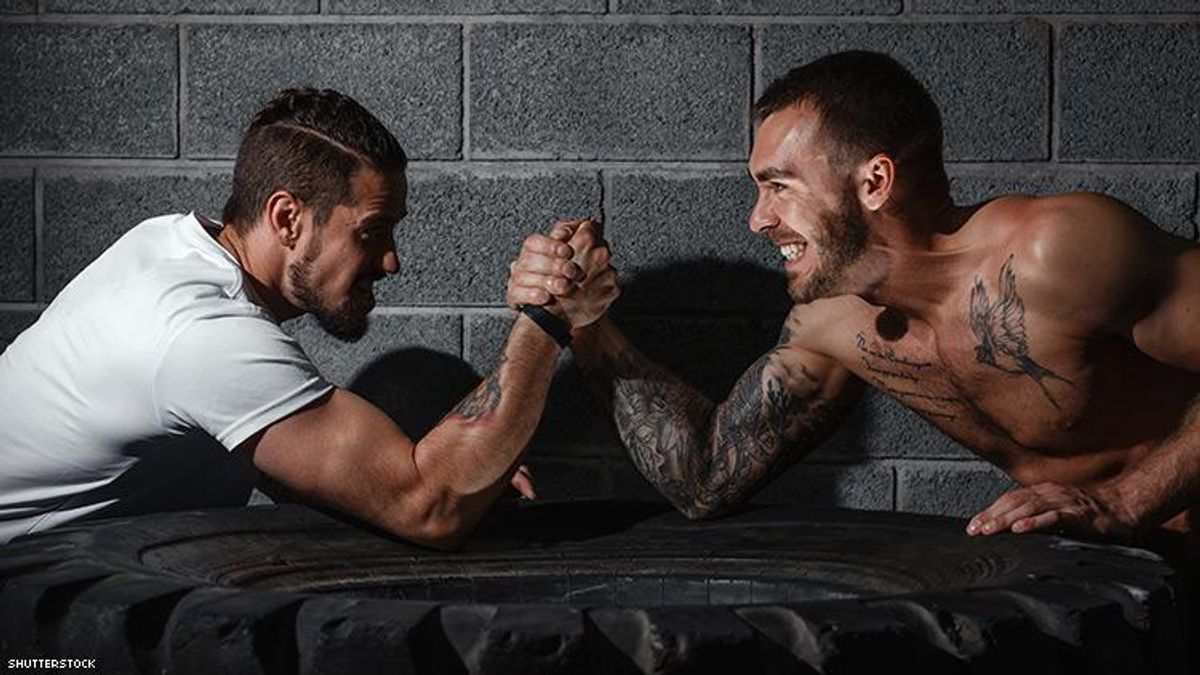Voices
Toxic Masculinity and Me

The world pressures us to be the best men we can be, but what does that actually mean?
David Artavia
October 08 2018 5:00 AM EST
October 24 2018 1:42 AM EST
By continuing to use our site, you agree to our Private Policy and Terms of Use.

The world pressures us to be the best men we can be, but what does that actually mean?
One of my earliest childhood memories is the smell of grass. Jose (the class bully) loved shoving my face to the ground in my elementary schoolyard. He'd make sure everyone saw too, especially the girls. One day, my teacher pulled us apart and wiped broken bits of lawn from my hair. I thought she was going to comfort me but instead she demanded, "Why didn't you fight back?"
I assumed my teacher was right to question me. Why didn't I fight back? Even if half the class saw my face being shoved in the ground, I could at least say I didn't back down. After all, that's the real test. I never forgot it.
The worst part was admitting to my dad I was getting bullied. He was an officer for the Houston Police Department and former Marine. He knew how to fight. But he was one of the good cops: calm, compassionate, and courageous. He taught me how to prove my worth through example, rather than fisticuffs. Unfortunately, the rest of the world didn't embrace his values. An eagerness to prove oneself is deeply rooted in male culture and has been for centuries. I'm not the first guy to be dominated on the playground -- or belittled for not fighting back -- and I definitely won't be the last.
A particular brand of manliness has been revered in literature as far back as Homer's Iliad, which some scholars credit for defining the virtues of traditional masculinity: heroism, strength, fearlessness, leadership -- and above all, dominance. But are these traits realistic, or are they simply a fanciful notion? And who mandated these traits as an exclusive domain of cisgender males? Such virtues are woven in the human spirit and know no gender.
Masculinity has not only become an identity, for men living in our social media-obsessed world, it's turned into a currency. It defines not only how we perceive our own value, but also how the world defines us as a person. The sad part is, once we fall into this obsession, warped realities of the ideal male body can make us delusional. If we truly believe a man is defined by his abs, or is only a "real" man if he can dominate someone else, what other kind of nonsense are we willing to believe?
Masculinity has morphed into something completely superficial. Rather than honing in on a person's character, we've made it a fashion statement. "Masc for Masc" doesn't mean strength, power, or courage. It means, how gender-normative and straight looking are you? How much of your "gayness" are you willing to hide from the world because you don't think it's fashionable, or fuckable? The anxiety to be valued by our masculinity is killing us -- literally.
A 2016 study published in the Journal of Counseling Psychology, conducted by Indiana University Bloomington, showed that men who adopt stereotypically ideas about what appropriate masculine behaviors are have "poorer mental health and less favorable attitudes towards seeking psychological help."
"[The study] shows that the performance of masculinity means that any sign of 'weakness' erases the facade that has been so carefully built up over time," Professor Andrea Davis, chair of the Department of Humanities at York University in Toronto, told Broadly. Results of the study show how sexism and femmephobia can be a response to stress experienced by these types of men while trying to maintain an image.
According to the American Foundation for Suicide Prevention, men are 3.5 times more likely to kill themselves than women, and the majority of those who do are white. In 2016 alone, white males accounted for seven out of every 10 suicides. But suicide doesn't just cost lives, it hurts the economy, costing the United States $69 billion each year -- 97 percent of which is attributed to lost productivity.
Like racism, sexism, and homophobia, toxic masculinity is a social construct. People are making money from it, and it's undoubtedly been harnessed by the advertising industry.
An 2017 ad for Axe body spray took the opposite approach, using their ad as a PSA to explain that 72 percent of men have been told how a "real man" should behave. The ad ultimately asks males viewers if it's OK for guys to be themselves. It's been viewed over 706,000 times -- what may sound like a large audience, but not nearly enough to combat the rest of male culture's constant messaging to the contrary.
Those men who don't meet societal expectations can end up isolating themselves from emotional connections. According to Upworthy.com, Niobe Way, a professor of applied psychology at New York University and author of Deep Secrets: Boys' Friendships and the Crisis of Connection, concluded that "boys in early adolescence express deeply fulfilling emotional connection and love for each other, but by the time they reach adulthood, that sense of connection evaporates."
As children we are inducted into the expectations of masculinity by adults who ask why we don't fight back or demand we stop "being a pussy" and "man up" to become the kind of men they expect us to be. Toxic masculinity has created more destruction than good, more walls than bridges, and more chains than helping hands.
Post #MeToo and #TimesUp, it's starting to look like this generation might spearhead that shift.
DAVID ARTAVIA is the managing editor of The Advocate.